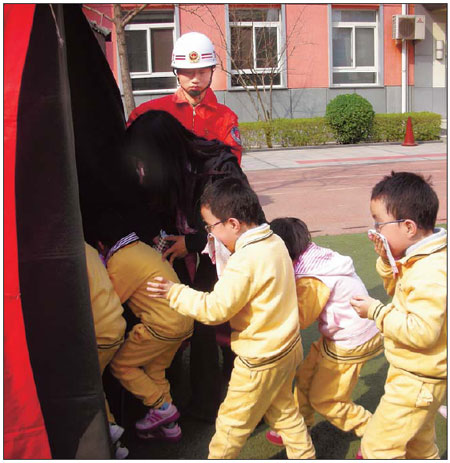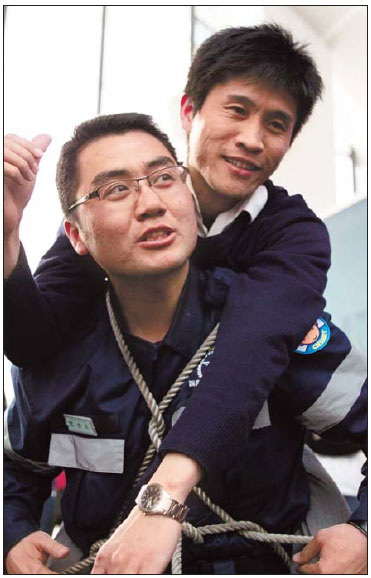Society
Lessons on living through disaster
Updated: 2011-03-31 07:58
By Wu Wencong and Todd Balazovic (China Daily)
|
Firefighters guide pupils at Beijing No 2 Experimental Primary School through an exercise to simulate an escape from a building when there is a fire and the lights have gone out. Wu Wencong / China Daily |
|
Bo Bing, a veteran rescue expert, shows the correct way to carry an injured person during a safety seminar for reporters in Dongcheng. Liu Zhe / for China Daily |
Students, journalists taught how to improve chances of surviving fires, earthquakes
Wednesday's lesson for a group of students at Beijing No 2 Experimental Primary School was how to quickly evacuate the school in an orderly manner during an emergency.
"We were taught to leave the classroom for the playground within two minutes after the signal, which either comes from the speaker or the bell," said 7-year-old Xue Kaixin, who pretended that someone broke her arm during the evacuation.
The teacher bandaging Xue's arm, who asked to be referred to only as Chu, said this drill made her a little nervous and she even dropped the bandage.
Chu is an art teacher at the school, but she told METRO that all the staff members have been trained in first aid, including treating broken limbs.
The drill for the 600 Grade 1 students was the fourth emergency drill since last semester, but the first in cooperation with the municipal fire bureau.
After the evacuation, the students split up into three groups. One group was shown equipment used to help people in an emergency, such as tools to cut steel bars; another group was asked to pass through a large tent in complete darkness led by a teacher, simulating fleeing with the power off; the rest got the chance to experience a simulated magnitude-6 earthquake from inside a truck.
"We were told to cut off the electricity when we feel an earthquake coming at home, to avoid the possibility of fire afterwards," said a student named Mu Yanzhuo.
"It was an interesting experience," said Mu, who kept screaming when hiding under the table in the truck. "But I think I will be a lot calmer next time in case of a real earthquake."
Wang Junjie, deputy head of the fire prevention department of the Xicheng district fire brigade, said the brigade's next plan is to choose at least a dozen middle schools and primary schools in the district for similar drills.
"This way works better than drills organized by schools alone," said Wang. "By being in the fire truck and experiencing a simulated earthquake, kids will have a deeper memory of the knowledge of evacuation procedures during an emergency."
Meanwhile on Wednesday, in Dongcheng district dozens of journalists were taught tricks of the survival trade as one of China's top rescue workers demonstrated how to increase the chances of making it through an earthquake alive. "The average time to react to an earthquake is anywhere between 10 and 30 seconds, depending on how far away you are from the epicenter," said Dr Bo Bing, who quickly brushed aside several shouted suggestions from the audience that the best thing to do was "run away".
Even if there is time to run away, Bo said, often the ground is shaking too much.
"It's like trying to run on a wave," he told media correspondents gathered at the Beijing Municipal Information Office. Bo, who recently returned from the Christchurch quake in New Zealand, then described how to react, depending on which room you are in when the quake hits.
The bathroom is the safest, but only if you know what you are doing, he said. In an emergency, if there is time, turning on the taps and crouching near the toilet and away from the outside wall offers the most protection. Turning on the taps allows access to water, which for one survivor of the Sichuan quake enabled him to survive more than a week before he was rescued. Bo went on to give interactive demonstrations to members of the media on how to tie a safety harness, as well as the best way to carry an injured survivor.
Eric Baculinao, Beijing bureau chief for NBC, who recently returned from the Japanese earthquake zone, was given a detailed demonstration on how to tie himself into safety harness, should the need ever arise.
"It's important that both ordinary people and media know how to survive such disasters," Baculinao said.
China Daily
(China Daily 03/31/2011 page)
Specials

Tea-ing up
More turning to Chinese tea for investment opportunities like vintage wine

A cut above
The ancient city of Luoyang is home to a treasure trove of cultural wonders.

Rise and shine
The Chinese solar energy industry is heating up following recent setbacks in the nuclear sector

